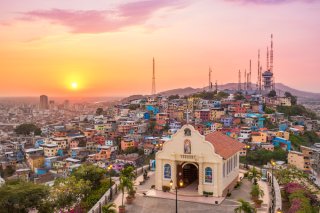The United States Must Prevent Ecuador’s Downward Spiral
With new President Daniel Noboa taking power, the United States should seize the opportunity to steer Ecuador away from China’s sphere of influence.
With the ferocious fighting in Ukraine and ongoing escalation of the Israel-Hamas conflict, Washington finds itself overlooking the recent volatility in Ecuador. Today’s Ecuador is virtually unrecognizable from the country I lived in seven years ago. In 2023, Ecuador was ranked as the third-most violent country in South America, having quadrupled both its homicide rate in the past five years and prison population since 2009. Almost two in three Ecuadoreans polled by Gallup state they feel unsafe walking alone past daylight. Ecuador’s political spiral earlier this year supplements this insecurity. This past May, Ecuador found itself without a national legislature or a reliable leader. Former President Guillermo Lasso dissolved the National Assembly after facing impeachment proceedings.
The country then broke new records in the illicit production of cocaine this season. In August, authorities in Spain, Greece, and Italy seized multiple cocaine shipments masked in caches of banana imports. In fact, police in the Netherlands discovered cocaine valued at around $660 million in the port of Rotterdam. Now, the United Nations reports that Ecuador is responsible for over a third of global cocaine trafficking. For mayors and politicians who publicly speak out about Ecuador’s descent into a narco-state, open assassination awaits. One such critic was National Assembly member Fernando Villavicencio, who, at his presidential campaign rally on August 18, was shot dead by gang members linked to drug trafficking.
The United States has the opportunity to stop Ecuador’s slide into a crime-ridden country reminiscent of Colombia under Pablo Escobar. If U.S. policymakers ignore Ecuador’s dire situation, China stands ready to compete for Ecuador’s attention. For the past two years, the PRC has become Ecuador’s largest trading partner, with 2022 witnessing bilateral trade grow to $13 billion—a 20 percent increase from 2021. In 2008, when the administration of President Rafael Correa defaulted on foreign debt, Chinese state-owned enterprises swooped in with favorable credit lines in exchange for promised daily shipments of 96,000 barrels of crude oil to the mainland. Proclaiming Ecuador as a key stakeholder in the Belt and Road initiative, the Chinese commerce ministry also played a vital role in cooperating with Ecuador in building large projects like the Coca Codo Sinclair Hydroelectric Plant. In mid-September, Ecuador and the PRC completed a $1.4 billion debt restructuring deal, signifying active efforts by the PRC to target Ecuador’s financial options.
However, the PRC’s narrow focus on economic assistance leaves the United States a window to support Ecuador’s internal security interests. With 2024 approaching, the United States should capitalize on the recent election of President Daniel Noboa to steer Ecuador away from China’s sphere of influence. President Noboa pursued his undergraduate degree at New York University and earned his master’s degrees at Northwestern, Harvard Kennedy School of Government, and George Washington University. His student experience in the United States, pro-business stance, and fluency in English offer a baseline for U.S. diplomacy that his predecessors did not possess. However, Noboa’s lack of credentials in domestic security elicits doubt about his ability to address the rise in narco-trafficking. As a result of such criticism, President Noboa may be receptive to increased U.S. security assistance.
A number of policy options are available. The White House should deliver more security aid than the $3.1 million allocated to Ecuador in August. The Department of Defense should build upon the momentum accrued by this year’s inaugural U.S.-Ecuador Defense Bilateral Working Group by increasing the enrollment of Ecuadorean senior military officers in the U.S. senior war colleges. In addition, the Pentagon should provide security advisors to assist Ecuadorean operations in eradicating FARC dissidents who migrated to Ecuador’s borders after refusing to disarm in 2016.
To avoid the echoes of the failed Plan Colombia initiative, Washington needs to make full use of USAID and the State Department for greater rural outreach to farmers and to initiate a counternarcotic information campaign. Finally, the threat of Chinese fishing vessels in the Galapagos Islands and the cartels’ use of narco-submarines should galvanize the U.S. Navy to conduct visit, board, and search and seizure (VBSS) military exercises with Ecuador’s littoral Navy. Most importantly, the Biden Administration should coordinate with the Noboa administration in drafting a robust U.S.-Ecuador counternarcotic strategy that voices similar solutions emphasized in the Office of National Drug Policy’s 2021 U.S.-Colombia counternarcotics strategy. In doing so, the United States can reverse its negative reputation developed in South America by the War on Drugs and promote Ecuador as a proving ground for the future.
Andrew Song serves as an active-duty submarine officer in the U.S. Navy with prior experience in the U.S. Intelligence Community. He graduated from Yale University with a degree in Global Affairs and has written on security issues for the Center for International Maritime Security, U.S. Air Force, and Military Review. His views and opinions do not reflect those of the Department of Defense and are solely his own.
Image: Shutterstock.com.

